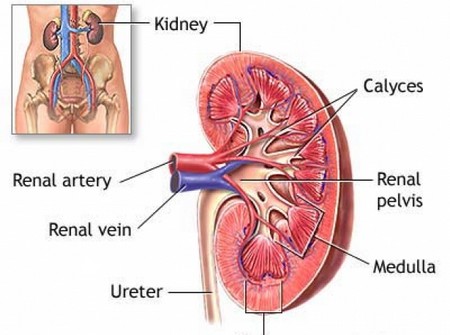Diabetic nephropathy, or disease of the kidneys, is caused by a mechanism similar to that of diabetic retinopathy: damage to blood vessels and nephrons as a result of long-term high blood glucose. Kidney damage is particularly serious because you cannot live without them, and for diabetics, damage to one kidney usually implies present or highly potential damage to both.
The kidneys are highly vascular organs; that is, they contain many blood vessels, which serve as adjuncts to the nephrons, which are the main filtering units of the kidneys. Nephrons filter out waste products carried to them by the bloodstream. The cleaned blood recirculates once it has dumped its load of waste into the nephrons. Waste is then transported to larger tubules and then to the outside of the body in the form of urine. Therefore, if the blood vessels of the kidney or the nephrons are damaged, toxic waste cannot be removed and it builds up in the bloodstream and will eventually kill you.

Diabetic nephropathy can be prevented, but it cannot be reversed once the process has started. If the problem gets so bad that you reach a point called end-stage renal disease (renal is a medical term for kidney function), you would need dialysis (an artificial method of removing toxins from the blood) and a kidney transplant. If, at the time you need one, there is a lot of competition for a kidney (and there always is), diabetics and people with some other chronic diseases are put at the bottom of the list.
Symptoms of diabetic nephropathy, which start so gradually that you hardly notice them and then increase in intensity, include swelling of the ankles, hands, and face; loss of appetite; a metallic taste in the mouth; skin irritation due to “sweating out” some toxins that should be excreted in urine; difficulty managing blood glucose; and fatigue. If you notice any of these symptoms, call your physician right away.
Kidney damage is one of the worst things that can happen to a diabetic. Even if you don’t die of it, treatment of end-stage renal disease is a ghastly procedure involving uncomfortable sessions of dialysis four or five times a week, either at home or in a hospital outpatient department.
It is much smarter to prevent kidney disease than to have to treat it. Here are some ways to do that:
- Keep your blood glucose in tight control.
- Keep your blood pressure normal: no higher than 140/90. High blood pressure stresses the kidneys, but there is a variety of medications to keep it in check if necessary.
- Treat all urinary tract infections, no matter how minor. Symptoms include cloudy or bloody urine, frequent urination, pain or burning when urinating, and the feeling of always needing to urinate.
- Have a routine urinalysis at least once a year. The test includes the following elements that indicate potential kidney dysfunction: protein in the urine (if yours shows a spillage of protein, eat less meat and poultry); micoalbuminurea, an indication of early problems; and creatinine, which shows the presence of certain waste products that should be excreted by the kidneys.